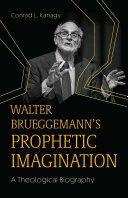
In this theological biography of the most prolific Old Testament student of the twenty-first century, Conrad Kanagy portrays Walter Brueggemann within the historical and cultural landscape of his formation. Kanagy follows Walter from his childhood home in Blackburn, Missouri, to Elmhurst College, Eden Theological Seminary, and Union Theological Seminary. Kanagy introduces us to the teachers who most influenced Brueggemann's personal and theological development. We observe Walter Brueggemann's unflappable energy as he moves toward the publication of The Prophetic Imagination, which will land him on the theological map of biblical studies and the American church. This breakthrough will define the rest of Brueggemann's life as he pivots among the biblical text, classroom, church, and world. The book addresses the riddle of The Prophetic Imagination's surprising emergence and enduring resilience, peering deeply into the theologian's interior life, about which little has been understood by even those closest to him. If all "theology is biography," we have missed much about Brueggemann's understanding of God by knowing so little of his person. The book's integration of his work and life within his community across nine decades reveals the most complete portrait to date of this remarkable prophet, pastor, preacher, teacher, and friend. Still, after all the careful research, much of who Walter Brueggemann is remains a mystery. He rejects reductionist portraits of himself, the biblical text, and God. He recognizes that the worlds we construct theologically are messy, perhaps because he sees the "wild and woolly" God of the world as more than a bit messy: a God who cannot be fully measured, a God who pivots just when we imagined we knew the way, and a God whose mystery and preference for openness and unpredictability are enough to keep any one of us on our toes.